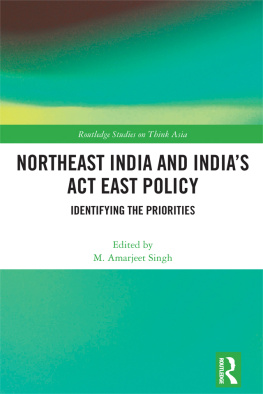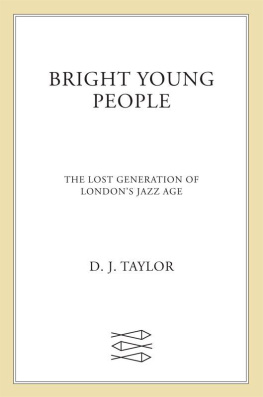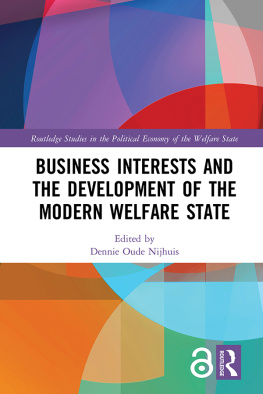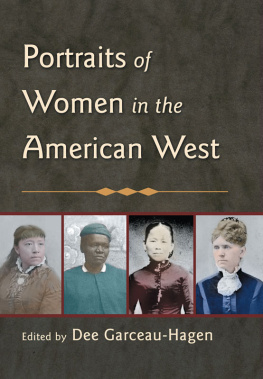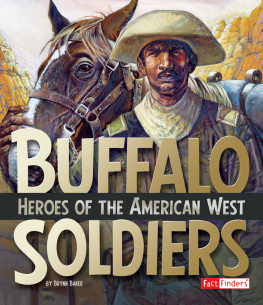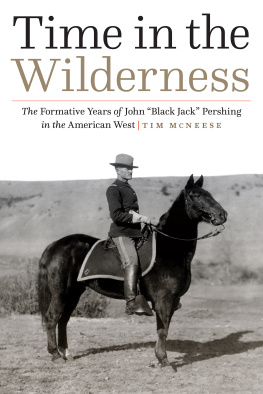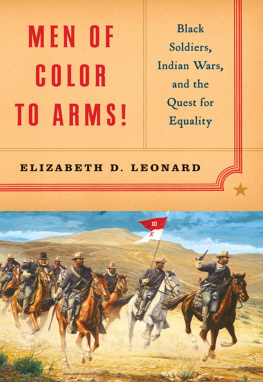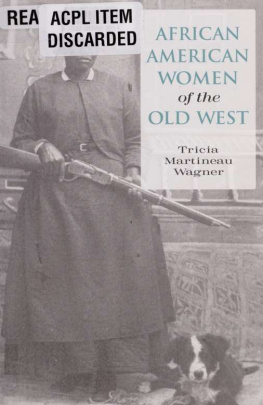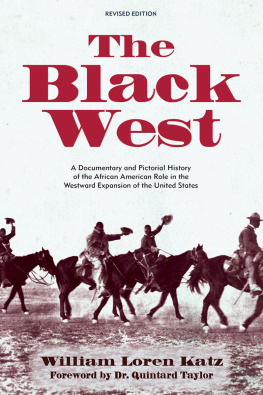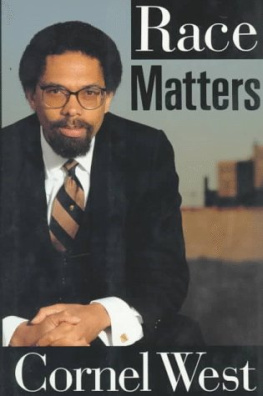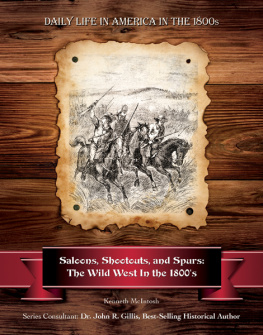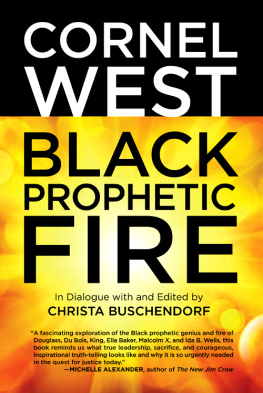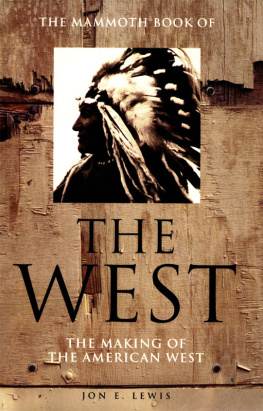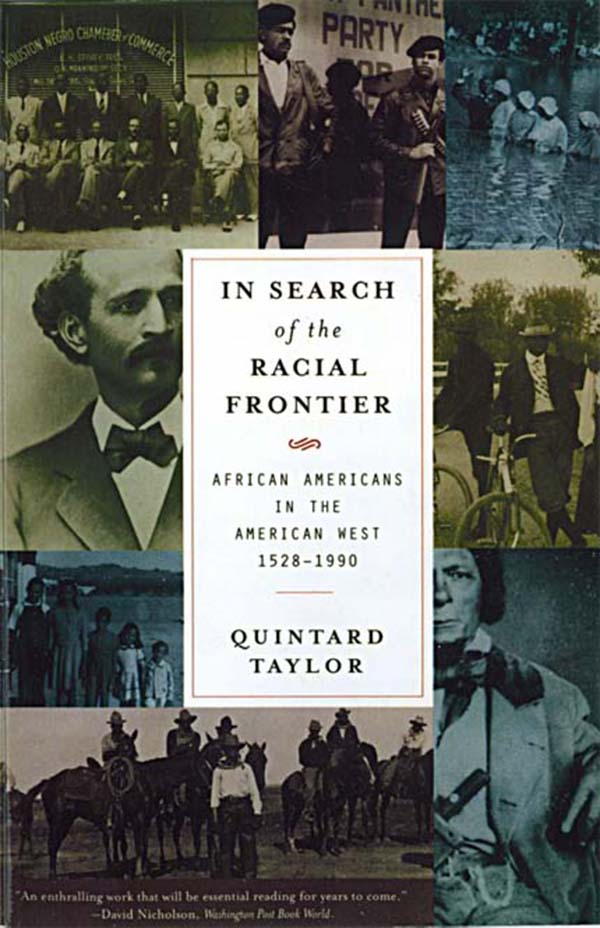
More praise for In Search of the Racial Frontier
An absorbing chronicle.... Marshaling a wealth of primary source material, Taylor documents black Westerners participation in all aspects of life in the American West and, in the process, reclaims an important dimension of African American history.
Publishers Weekly
Those looking for a solid overview of the African-American presence in our region would do well to let Quintard Taylor be their guide.
John C. Walter, Seattle Times
Taylor has given us the most comprehensive survey of his subject in a generation, and by far the most ambitious ever in scope and chronology. Clearly written, widely researched, and filled with vivid stories and details, this book demonstrates conclusively that blacks have played an important role in creating both the Old West and the New West.
Donald Worster, University of Kansas
Quintard Taylor, certainly a foremost historian of the Black West, significantly enriches and broadens our understanding of the black quest for freedom on the racial frontier. His dynamic and insightful history spans 400 years, clearing away mountains of debris born of age-old myths and stereotypes. In Search of the Racial Frontier adroitly reconstructs a black West that is, among other things, urban to the core. This is a major contribution to American history and to African American studies. It is not to be missed.
Darlene Clark Hine, Michigan State University
Thoroughly researched, lucidly written, and powerfully argued, In Search of the Racial Frontier is a stellar synthesis of black Western history. It corrects the usual Southern and Northern bias in our understanding of the African American experience. Scholars, teachers, public policy experts, and the general reader will remain indebted to Dr. Taylor deep into the twenty-first century.
Joseph Trotter, Carnegie-Mellon University
Quintard Taylors gracefully written overview of the African American West challenges simple interpretations of frontier opportunity and inaccurate black/white models of race in America. In a wide-ranging narrative that extends from the first explorations of northern New Spain to urban uprisings of the 1990s, Taylor describes a diverse cast of black western women and men in a variety of social relationships with other westerners. In Search of the Racial Frontier fills a long-neglected void in the histories of the American West and of U.S. race relations.
Elizabeth Jameson, University of New Mexico
In this land mark history, African Americans take their rightful place in the mainstream of the wests exploration, settling, and social fabric. The book tells the often-surprising story of African Americans who were absorbed into Native American culture; of black farmers, business owners, and entertainers; and of the long struggle against injustice and bigotry from Brown vs. Board of Education to the rise and fall of the Black Panther Party. Through vast research and elegant writing, Quintrd Taylor has filled a major void in the history of the American West, remainding us throughout that the African American experience encompasses our entire country.
[Rich] in scope and scholarly detail-it will certainly stand as the definitive work on the subject for some time to come.
James A. Miller, Boston Globe
[B]y far the most complete general history of blacks in the west.... Marks a new stage in racial and western historiography.
Scott L. Malcolmson, Newsday
Also by QUINTARD TAYLOR:
THE FORGING OF
A BLACK COMMUNITY
In Search of
the Racial Frontier
AFRICAN AMERICANS
IN THE AMERICAN WEST
15281990

Quintard Taylor

WWNORTON & COMPANY
New York London
Some images in this e-book are not displayed owing to permissions issues.
To
Grace and Quintard Taylor,
the first historians I ever knew
Copyright 1998 by Quintard Taylor
All rights reserved
First published as a Norton paperback 1999
Excerpt of One-Way Ticket from Collected Poems by
Langston Hughes. Copyright 1994 by the Estate of
Langston Hughes. Reprinted by permission of Alfred A. Knopf, Inc.
For information about pennission to reproduce selections from this book, write to
Permissions, W. W. Norton & Company, Inc.,
500 Fifth Avenue, New York, NY 10110.
The Library of Congress has cataloged the printed edition as follows:
Taylor, Quintard.
In search of the racial frontier: African Americans in the
American West, 15281990 / by Quintard Taylor.
p. cm.
Includes bibliographical references (p. ) and index.
ISBN 0-393-04105-0
1. Afro-AmericansWest (U.S.)History. 2. West (U.S.)History.
I. Title.
E185.925.T39 1998
978.00496073dc21
97-14747
CIP
ISBN 0-393-31889-3 pbk.
ISBN 978-0-393-24636-0 (e-book)
W. W. Norton & Company, Inc., 500 Fifth Avenue, New York, N.Y 10110
www.wwnorton.com
W. W. Norton & Company Ltd., 10 Coptic Street, London WC1A 1PU
Maps

Tables


In Search of the Racial Frontier is the result of five years of reflecting, researching, collecting, consulting, and writing on the African American West. In many ways this effort has been a group project with dozens of people offering advice, critiques, and myriad forms of support. Without their help and encouragement this project would not have been completed. I want to thank a number of persons who rendered invaluable assistance.
Patricia Nelson Limerick was there almost from the genesis of the book. Her enthusiasm for this project led her to contact W. W. Norton on my behalf. Her action immediately provided me a publisher. More important, it made me much more aware of the value of this work to historians, students, and the general public.
Edwin Barber, my editor at W. W. Norton & Company, became involved in this project in 1992. Through numerous phone and E-mail conversations he led me through the labyrinth of the publishing world, constantly reminding me of my responsibility to remain focused and on task. His editorial suggestions in the final year of this project transformed ambiguity into clarity, creating a much stronger, richer, more readable manuscript.
A number of colleagues at the University of Oregon read all or portions of the manuscript and added their valuable insights and suggestions. I think in particular of Earl Pomeroy, Richard Maxwell Brown, James Mohr, Jeff Ostler, Barbara Welke, Peggy Pascoe, and Daniel Pope. I received critiques from other campus colleagues, including Edwin Coleman, Sandra Morgen, Elizabeth Ramirez, Robert Proudfoot, Marshall Sauceda, Joe A. Stone, and Steven L. Stone.
The list of historians and other university scholars who assisted includes Sue Armitage, Washington State University; Alwyn Barr, Texas Tech University; Eugene Berwanger, Colorado State University; Albert L. Broussard, Texas A&M University; Thomas R. Buecker, Fort Robinson Museum; Lonnie Bunch III, Smithsonian Institution; Clarence Caesar, California Office of Historic Preservation; Suzanne Campbell, San Angelo, Texas; Robert Cherny, San Francisco State University; Garna Christian, University of Houston; Ronald G. Coleman, University of Utah; Willi Coleman, University of Vermont; Thomas Cripps, Morgan State University; Douglas Daniels, University of California, Santa Barbara; Lawrence B. de Graaf, California State University, Fullerton; Richard Etulain, University of New Mexico; Douglas Flamming, California Institute of Technology; Neil J. Foley, University of Texas; Jimmie L. Franklin, Vanderbilt University; Christopher Friday, Western Washington University; Larry Gerlach, University of Utah; Bruce Glasrud, Sul Ross State University; William H. Goetzmann, University of Texas; David Gutirrez, University of California, San Diego; Ramn A. Gutirrez, University of California, San Diego; Willie Hill, University of Colorado; Albert Hurtado, Arizona State University; William H. Issel, San Francisco State University; Elizabeth Jameson, University of New Mexico; Howard Jones, Prairie View A&M University; William M. King, University of Colorado; Paul Lack, McMurry University; William Lang, Portland State University; Rudolph Lapp, San Mateo, California; William and Shirley Leckie, Winter Springs, Florida; Daniel F. Littlefield, Jr., University of Arkansas at Little Rock; George Lipsitz, University of California, San Diego; James Locklear, University of Nebraska; Bradford Luckingham, Arizona State University; Charles H. Martin, University of Texas, El Paso; Delores N. McBroome, Humboldt State University; Shirley Ann Moore, California State University, Sacramento; Elizabeth McLagan, Portland; Dennis Mihelich, Creighton University; Darrell Millner, Portland State University; Kevin Mulroy, Gene Autry Museum; Gerald Nash, University of New Mexico; Merline Pitre, Texas Southern University; Howard Rabinowitz, University of New Mexico; John A. Ravage, University of Wyoming; Wilson Ed Reed, North Texas State University; William Richter, Tucson, Arizona; Glenda Riley, Ball State University; Ricardo Romo, University of Texas; James A. Ronda, University of Tulsa; Vicki Ruiz, Arizona State University; Frank N. Schubert, Army War College; Malik Simba, California State University, Fresno; Stephanie Smith, Ohio State University; Alonzo Smith, Smithsonian Institution; Clarence Spigner, University of Washington; Joe W. Trotter, Carnegie-Mellon University; William M. Tuttle, University of Kansas; David J. Weber, Southern Methodist University; Elliott West, University of Arkansas; Richard White, University of Washington; and Ruthe Winegarten, Austin, Texas.
Next page


